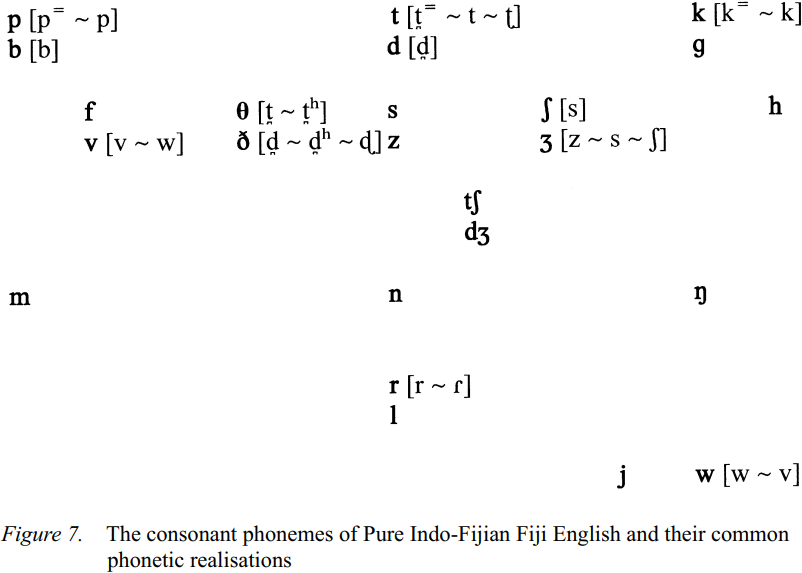


 Grammar
Grammar
 Tenses
Tenses
 Present
Present
 Past
Past
 Future
Future
 Parts Of Speech
Parts Of Speech
 Nouns
Nouns
 Verbs
Verbs
 Adverbs
Adverbs
 Adjectives
Adjectives
 Pronouns
Pronouns
 Pre Position
Pre Position
 Preposition by function
Preposition by function 
 Preposition by construction
Preposition by construction
 Conjunctions
Conjunctions
 Interjections
Interjections
 Grammar Rules
Grammar Rules
 Linguistics
Linguistics
 Semantics
Semantics
 Pragmatics
Pragmatics
 Reading Comprehension
Reading Comprehension|
Read More
Date: 2024-04-19
Date: 2024-04-24
Date: 2024-06-04
|
1. The Pure Fiji English of Indo-Fijian speakers, like that of Fijians, allows few consonant clusters, especially in final position e.g. last > [las], although /ks/ does frequently occur, especially in [aks] for ask, also as in Fijian English.
2. Consonant clusters, both initial and final, quite commonly receive an epenthetic vowel in Pure Indo-Fijian English, e.g. free > [fari], plate > [pilet], film > [filam], blouse > [bilaus], pliers > [pilaias], etc. Epenthetic vowels are particularly common in older English loans that have been fully nativised in Fiji Hindi, e.g. farāk < ‘frock’, gilās < ‘glass’, kulubāl < ‘crowbar’ (Siegel 1991); however, this tendency is not as strong nowadays.
The regular past tense morpheme {-ed} sometimes receives an [εd] pronunciation when in Standard English it is rendered as [d] or [t], e.g. robbed > [rɔbεd] , asked [askεd], learned (verb) > [lεnεd]. However, this is probably due to a spelling pronunciation.
3. Word initial /s+C/ clusters typically have a syllable initial prothetic /i/, e.g. school > [iskul], foolscaps > [fuliskeps], student > [istudent], sport > [ispot], etc. This is clearly an influence of the first language since Hindi (both standard and Fiji varieties) does not allow such initial consonant clusters. Fiji Hindi has also nativised English loans with a prothetic vowel, e.g. astabal < ‘stable’, isTimā < ‘steamer’ (Siegel 1991).
The consonant phonemes of Pure Indo-Fijian Fiji English and their most common phonetic realizations are shown in Figure 7.

|
|
|
|
"عادة ليلية" قد تكون المفتاح للوقاية من الخرف
|
|
|
|
|
|
|
ممتص الصدمات: طريقة عمله وأهميته وأبرز علامات تلفه
|
|
|
|
|
|
|
ضمن أسبوع الإرشاد النفسي.. جامعة العميد تُقيم أنشطةً ثقافية وتطويرية لطلبتها
|
|
|